初升高英语辅导资料1
初中英语教辅材料

初中英语教辅材料推荐:
1. 《初中英语必刷题》:这本书针对的是初中学生,适合九年级学生中考复习使用。
这本书的内容是非常丰富的,包括阅读理解、完型填空、语法填空、七选五等,题目类型全面,具有很强的针对性和实践性。
2. 《初中英语词汇变形》:这本书主要针对的是初中英语词汇的学习和应用,书中的内容会根据词汇变形设计多种练习,通过练习帮助学生更好地掌握和应用词汇,可以更好地提高学生对词汇的理解和记忆。
3. 《初中英语语法填空》:这本书针对的是初中英语语法的学习和应用,书中的内容涵盖了初中英语语法的重点和难点,通过练习和讲解帮助学生更好地掌握和应用语法知识,提高英语写作和阅读理解的能力。
4. 《初中英语阅读理解》:这本书主要针对的是初中英语阅读理解的学习和应用,书中的内容涵盖了初中英语阅读理解的常见题材和难度级别,通过练习和讲解帮助学生更好地掌握和应用阅读理解技巧,提高阅读理解的能力。
希望以上推荐对您有所帮助,祝您学习进步!。
中考必备的6本英语辅导书
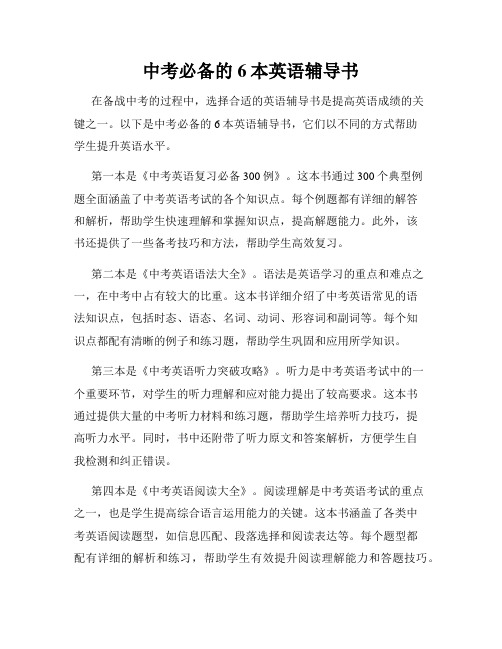
中考必备的6本英语辅导书在备战中考的过程中,选择合适的英语辅导书是提高英语成绩的关键之一。
以下是中考必备的6本英语辅导书,它们以不同的方式帮助学生提升英语水平。
第一本是《中考英语复习必备300例》。
这本书通过300个典型例题全面涵盖了中考英语考试的各个知识点。
每个例题都有详细的解答和解析,帮助学生快速理解和掌握知识点,提高解题能力。
此外,该书还提供了一些备考技巧和方法,帮助学生高效复习。
第二本是《中考英语语法大全》。
语法是英语学习的重点和难点之一,在中考中占有较大的比重。
这本书详细介绍了中考英语常见的语法知识点,包括时态、语态、名词、动词、形容词和副词等。
每个知识点都配有清晰的例子和练习题,帮助学生巩固和应用所学知识。
第三本是《中考英语听力突破攻略》。
听力是中考英语考试中的一个重要环节,对学生的听力理解和应对能力提出了较高要求。
这本书通过提供大量的中考听力材料和练习题,帮助学生培养听力技巧,提高听力水平。
同时,书中还附带了听力原文和答案解析,方便学生自我检测和纠正错误。
第四本是《中考英语阅读大全》。
阅读理解是中考英语考试的重点之一,也是学生提高综合语言运用能力的关键。
这本书涵盖了各类中考英语阅读题型,如信息匹配、段落选择和阅读表达等。
每个题型都配有详细的解析和练习,帮助学生有效提升阅读理解能力和答题技巧。
第五本是《中考英语写作范文》。
写作是英语考试中锻炼语言表达能力和逻辑思维的一种方式。
这本书收录了多个中考英语写作范文,包括作文、信件、口头通知和拓展写作等。
每篇范文都有详细的写作指导和评分标准,帮助学生了解写作技巧和要点,提高写作水平。
第六本是《中考英语词汇记忆宝典》。
词汇是英语学习中的基础,也是中考中的重要考点。
这本书系统整理了中考英语中常见的词汇,包括高频词汇、同义词和反义词等。
每个词汇都配有中英文解释和例句,帮助学生记忆和理解词汇的用法和意义。
通过选择适合自己的英语辅导书,并结合平时的学习和练习,相信同学们能够事半功倍,取得中考优异成绩。
成都初中英语教辅资料

成都初中英语教辅资料
以下是一些成都初中英语教辅资料的推荐:
1. 《初中英语词汇手册》:这本书提供了初中阶段常用的单词和词组,以及相应的释义和例句,帮助学生扩展词汇量。
2. 《初中英语语法指南》:这本书系统地介绍了初中英语语法的基本知识点和规则,包括时态、语态、虚拟语气等,适合学生复习和巩固语法知识。
3. 《初中英语听力训练》:这是一套针对初中生设计的听力训练教材,通过大量的听力练习和听力理解题目,提高学生的听力水平和听力技巧。
4. 《初中英语阅读理解》:这本书收集了一系列适合初中生阅读的文章和阅读理解题目,旨在培养学生的阅读能力和理解能力。
5. 《初中英语写作指导》:这本书提供了一些写作技巧和范文,帮助学生提升写作能力,包括写作结构、词汇选择和句子表达等方面的指导。
这些教辅资料可以在当地的书店或在线购买平台上找到。
同时,也建议与学校的英语教师进行沟通,了解他们推荐的教辅资料和学习方法。
1。
初升高英语(并列句和复合句 )

教育学科教师辅导教案学员编号: 年 级:初三 课 时 数: 学员姓名:YYY 辅导科目:英语 学科教师: XX 授课类型 C 并列句和复合句 星 级 ★★★教学目标1、 正确区分并列句及复合句2、 掌握好各个并列句的用法(建议2-5分钟)批注:老师可以通过这两幅图片跟学生诠释什么是并列句(用并列连词连接起来的两个或两个以上的简单句叫做并列句),什么是复合句(复合句是由一个主句和一个或一个以上的从句构成的句子。
主句和从句都具有完整的主谓结构,主句是全句的主体,从句是主句中的一部分,不能独立存在)。
(建议20-25分钟)一、并列句用并列连词连接起来的两个或两个以上的简单句叫做并列句。
并列句的构成“简单句+并列连词+简单句”。
常用的并列连词C 并列句和复合句A BAB并列连词种类代表词用法联合连词and, both…and, notonly… but also用以连接句中的并列成分e.g. She studies not only English but also Japanese.选择连词or, either…or,neither…nor用以链接句中可供选择的成分。
e.g. Now I must go or I shall be late for school.The young man must be either mad or drunk.Neither he nor you are wholely right.转折连词but 用以表示意思的转折e.g. Summer is hot but winter is cold.因果连词so 用以表结果e.g. He was in bad health, so he could not work.原因连词for 用以表示原因或是引出一个推断的某种依据e.g. It is morning, for the birds are singing. (并不表示直接的因果关系)批注:老师可以通过挖空填词、翻译句子等形式对这些知识点进行巩固。
初升高衔接英语定语从句讲义(1)

定语从句(初高考点差异及衔接)定义:1.定语从句——在复合句中,作定语修饰名词或代词的从句(句意: …的)作用相当于形容词。
2.先行词——被定语从句修饰的那个名词3.关系词——引导定语从句的词叫做关系词。
在定语从句中,先行词可代替先行词在从句中充当成分。
考点1 3组易混关系代词的用法辨析1. 只用that不用which的情况(1)先行词是all,much,little,something,everything,anything,nothing,none等不定代词时。
All that you need to do is focus on one thing.(2)先行词被the only, any, few, no, very等修饰时。
Australia is the only country that is also a continent.(3)先行词是形容词的最高级或序数词或被形容词最高级、序数词修饰时。
This is the most interesting film that I’ve ever seen.(4)先行词既有人又有物时。
Do you know the things and persons that they are talking about?(5)当主句是以which或who开头的疑问句时。
Which is the bike that you lost?Who is the man that is reading over there?(6)当主句是以here, there开头时。
Here is the hotel that you have been looking for.(7)先行词在主句中作表语, 而关系代词也在从句中作表语时。
Shandong is no longer the province that it used to be.2. 只用which不用that的情况(1)关系代词前有介词时。
2023年初升高英语音标讲义
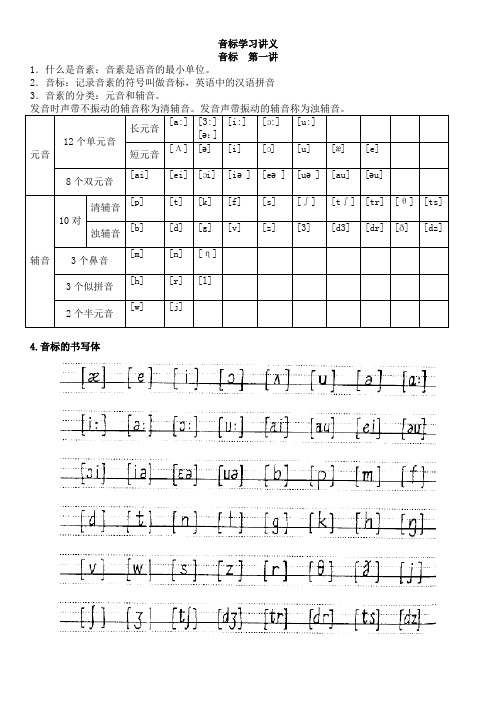
音标学习讲义音标第一讲1.什么是音素:音素是语音的最小单位。
2.音标:记录音素的符号叫做音标,英语中的汉语拼音3.音素的分类:元音和辅音。
元音12个单元音长元音[a:] [3:][ә:][i:] [ɔ:] [u:]短元音[Λ] [ә] [i] [ɔ] [u] [æ][e]8个双元音[ai] [ei] [ɔi] [iә ] [eә ] [uә ] [au] [әu]辅音10对清辅音[p] [t] [k] [f] [s] [∫] [t∫] [tr] [θ] [ts] 浊辅音[b] [d] [g] [v] [z] [3] [d3] [dr] [ð][dz]3个鼻音[m] [n] [η]3个似拼音[h] [r] [l]2个半元音[w] [j]4.音标的书写体26个字母与音标的对应"A" makes the sound /æ/ - apple, ant“B” makes the sound /b/- bee, bird“C”makes the sound /k/ - cat, cow“D” makes the sound /d/ - dog, deer"E" makes the sound /e/ - egg, elephant“F” makes the sound /f/ -fish, frog“G”makes the sound /g/ -girl, guitar“H” makes the sound /h/ - house,hat“I” makes the sound /i/---insect,igloo“J” makes the sound /dʒ /---jump,jacket“K” makes the sound /k/--- kite,king“L” makes the sound /l/---lion,leaf“M” makes the sound /m/--- monkey, mop“N” makes the sound /n /---night, night“O” makes the sound /o/--- octopus, ostrich“P” makes the sound /p/--- pig, pepper“Q” makes the sound /kw/--- queen, quarter“R” makes the sound /r /--- rose, rocket“S” makes the sound /s /--- salad, spoon“T” makes the sound /t/--- tiger, tent“U” makes the sound /ʌ /--- umbrella, upset“V” makes the sound / v /--- vase ,vegetable“W” makes the sound /w /--- walrus , wet“X” makes the sound /ks /--- axe, box“Y” makes the sound / j /--- yak, yard“Z” makes the sound /z /--- zebra , zig zag音标第二讲元音音标学习元音之间的差异,是由发音时各发音器官所采取的不同位置形成的。
初高中英语衔接资料(初升高英语)
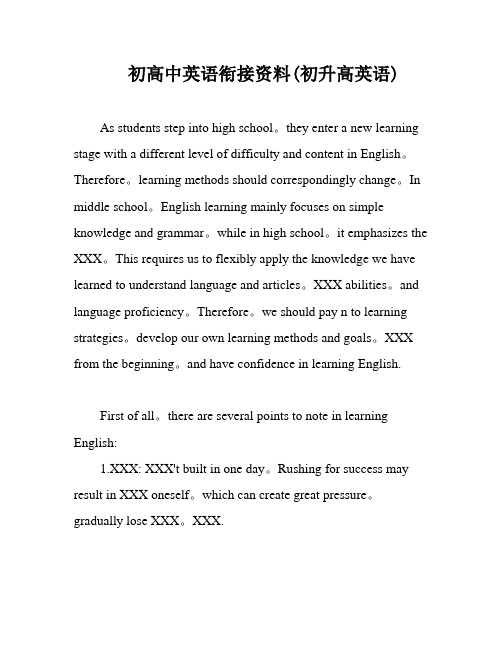
初高中英语衔接资料(初升高英语)As students step into high school。
they enter a new learning stage with a different level of difficulty and content in English。
Therefore。
learning methods should correspondingly change。
In middle school。
English learning mainly focuses on simple knowledge and grammar。
while in high school。
it emphasizes the XXX。
This requires us to flexibly apply the knowledge we have learned to understand language and articles。
XXX abilities。
and language proficiency。
Therefore。
we should pay n to learning strategies。
develop our own learning methods and goals。
XXX from the beginning。
and have confidence in learning English.First of all。
there are several points to note in learning English:1.XXX: XXX't built in one day。
Rushing for success may result in XXX oneself。
which can create great pressure。
gradually lose XXX。
初升高英语衔接之必备基础语法知识
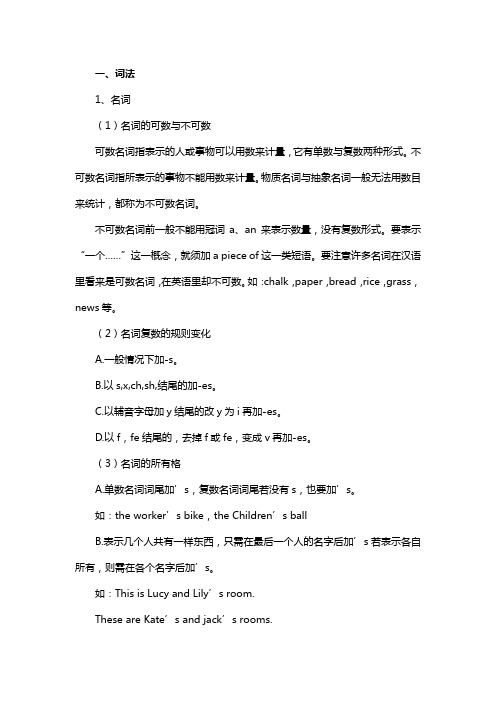
一、词法1、名词(1)名词的可数与不可数可数名词指表示的人或事物可以用数来计量,它有单数与复数两种形式。
不可数名词指所表示的事物不能用数来计量。
物质名词与抽象名词一般无法用数目来统计,都称为不可数名词。
不可数名词前一般不能用冠词a、an来表示数量,没有复数形式。
要表示“一个……”这一概念,就须加a piece of这一类短语。
要注意许多名词在汉语里看来是可数名词,在英语里却不可数。
如:chalk,paper,bread,rice,grass,news等。
(2)名词复数的规则变化A.一般情况下加-s。
B.以s,x,ch,sh,结尾的加-es。
C.以辅音字母加y结尾的改y为i再加-es。
D.以f,fe结尾的,去掉f或fe,变成v再加-es。
(3)名词的所有格A.单数名词词尾加’s,复数名词词尾若没有s,也要加’s。
如:the worker’s bike,the Children’s ballB.表示几个人共有一样东西,只需在最后一个人的名字后加’s若表示各自所有,则需在各个名字后加’s。
如:This is Lucy and Lily’s room.These are Kate’s and jack’s rooms.C.如果是通过在词尾加-s构成的复数形式的名词,只加’。
如:the students’books,the girls’blouses(另外:如果名词是有生命的,我们就用’s结构来表示所有关系。
如果名词所表示的事物是无生命的,我们就要用名词+of+名词的结构来表示所有关系。
)2、代词人称代词,物主代词,反身代词,指示代词,不定代词(1)人称代词第一人称单数I me my mine myself复数we us our ours ourselves第二人称单数you you your yours yourself复数you you your yours yourselves第三人称单数he him his his himselfshe her her hers herselfit it its its itself复数they them their theirs themselves(2)物主代词物主代词的用法:形容词性物主代词后面一定要跟一个名词;名词性物主代词可作主语、表语、宾语。
初升高衔接课--音标1

/nest/ /hæ z/ /sɪt/
Match the phonetics with the words !
/juːz/
/ˈpjuːpl/
/kɪŋ/
/rəʊz/
/sɒŋ/
/lɒŋ/
/waɪt/
/weə(r)/
wear
观察本列表长元音的字母组合有什么特点呢?
/ˈkæʒuəl/ /ˈpleʒə(r)/ /ˈjuːʒuəl/
试一试,目前你能准确读多少个音素呢?
英语共有48个音素,其 中元音音素20个,辅音 音素28个。音标放在两 条斜线(//)内。
48个音素要放在具 体单词的具体发音 中识记,更要注意 与单词拼写相结合, 形成单词拼读的 “音感”。
掌握了音标,发音标准,会有哪些好处?
1. 帮助自主准确拼读生词,提升单词学习能力 2. 能够按发音规则,快速准确记忆单词 3. 改善英语口音 4. 提高听力的识别词汇的准确性和敏锐性 5. 爱上大声读、讲英语,增强英语学习自信
Learning objectives 学习目标
1. 能准确读出英语48个音素; 2. 能根据音标准确读出生词发音; 3. 能根据读音更容易记忆和拼写单词。
英语音素与音标
Practice makes perfect
swap [swɒp] gossip [ˈgɒsɪp] accent [ˈæksent] dialect [ˈdaɪəlekt] identity [aɪˈdentəti]
Summarize(总结) the rule of different pronunciations.
字母 原音 开音节:
以元音字母后跟一个辅音字母 (除r外)和一个不发音的e字 母结尾的音节,如“a_e”; 或以元音字母结尾的音节;
英语资料初中升高中(总14页)

英语资料初中升高中-CAL-FENGHAI.-(YICAI)-Company One1-CAL-本页仅作为文档封面,使用请直接删除代词一、常用代词用法1.none,no one,neither,nothing和no(1)none“没人,没有任何东西”,既可指人,也可指物。
none后可接of短语,常用来回答how many/much的问题。
(2)no one表“没有人,谁也不”,只指人,作主语时,后跟单数动词。
常可用来回答who引导的问句。
—Who can answer the question谁能回答这个问题—No one.没人。
No one knows when he was born.没有人知道他的生辰。
(3)nothing意为“没有东西”,一般回答what。
—What’s in the cave洞里有什么—Nothing.没什么。
(4)neither指“两个人或物中一个也不,两者都不”,表否定意义,作主语时谓语动词用单数。
Neither answer is right.两个答案中没有一个是正确的。
二、other,others,any other,the other,another的用法(1)other表示泛指,意为“另外的、其他的”,常与复数名词或不可数名词连用。
如果其前有the,this,some,any,each,every,no,one以及形容词性物主代词时,其后就可接单数名词。
(2)others是other的复数形式,表示泛指,意为“别的人或物”,但不指全部。
特指时在其前加定冠词;前面可加限定词以及数量词,常构成some...others...。
(3)any other表示一个之外的其他任何一个,而不是两个之中的另一个。
(4)the other表示两者中的另外一个。
可单独使用,也可接单数名词。
(5)another常用于指三者或三者以上中的“另外一个”,泛指单数。
可单独使用,也可后接名词。
初升高英语暑假衔接第1部分-专题09.动词语态(教师版)

动词语态(初高考点差异及衔接)初中要求8种常见时态的被动语态表达形式:①一般现在时:am/is/are+过去分词;②一般过去时:was/were+过去分词;③现在进行时:am/is/are being+过去分词;④过去进行时:was/were being+过去分词;⑤一般将来时:will be+过去分词;⑥过去将来时:would be+过去分词;⑦现在完成时:has/have been+过去分词;⑧过去完成时:had been+过去分词。
高中要求我们将学习到更复杂的语法结构,因此主动语态和被动语态也会相对复杂一些。
被动语态在高中阶段,因为往往出现在较复杂的句子结构和词汇中,因而需要在学习的时候认真记忆词汇并分析句子结构。
【初中被动语态考点聚焦】考点一一般现在时的被动语态1.Every year in early October,Albuquerque International Balloon Festival is h inAlbuquerque,the biggest city in New Mexico.答案held句意:每年10月初,阿尔伯克基国际热气球节在新墨西哥州最大的城市阿尔伯克基举行。
本题考查动词的语态。
根据句意可知,此处意思是“举行”,且表示被动,故填held 。
2.There is also Hershey,which is well (know)as the chocolate company.答案known短语be well known as...意为“作为……而著名”。
3.It’s also (call)the Double Ninth Festival.答案called它又被称作重阳节。
根据语义可知本句应为被动语态,应用过去分词called 。
4.—How clean your car is!—Thank you.It (wash)very often.答案is washed句意:——你的汽车多干净啊!——谢谢你。
专题01 句子成分-2020年初升高英语衔接大讲堂

专题01 句子成分温馨提示:高中教材中,无论是要点讲解,书面表达,还是从句学习都会涉及句子成分,任何一个句子都需要严格的语法结构来组成,否则就会出现错误的句子,读不懂句子或则在作文中丢分。
因此,在进入高中学习之前,同学们一定要掌握句子成分。
•S: Subject 主语;V: Verb 动词(谓语);•O: Object 宾语;P: Predicative 表语;•OC: Object Complement 宾语补足语;•InO: Indirect Object 间接宾语;DO:Direct Object 直接宾语一、句子成分a. 主语(subject)常用名词和代词充当。
请画出下列句子的主语并思考由什么充当的主语:1. The sun rises in the east.2. Seeing is believing.3. To see is to believe.4. What he needs is a book.5. It is very clear that the elephant is round and tall like a tree.b.谓语(predicate):请画出下列句子的谓语We study English.I sleep.c. 表语(predicative):常用名词、形容词和短语充当。
常见系动词: be, sound(听), look(看), feel(摸),smell(闻), taste(吃), remain,keep, stay(保持,仍是), feel(感觉), 变得(become, turn, go, get), seem(似乎),appear(好像)...e.g.: 1. It sounds a good idea. 2. The boy looks smart.3. The food smells delicious.4. The food tastes good.请画出下列句子的表语:1. He is a teacher.2. He is kind.3. The picture is on the wall.d. 宾语:宾语是动作行为的对象。
初升高英语暑假衔接第1部分-专题07.连词及状语从句(学生版)

连词及状语从句(初高考点差异及衔接)初中要求并列连词and,or,either.…or,neither.…nor,but,for,so等从属连词主要有that,whether,if,when,where,so that等高中要求1.掌握并列连词的基本意义,根据句子之间的相互关系能正确运用连词。
掌握构成并列句的并列连词如:and,or,but,yet,so,while,when和either...or...,neither...nor...,not only...but also...等。
2.掌握从属连词主要考查连词的判断选用,以对时间状语从句、条件状语从句、让步状语从句和结果状语从句的考查最为频繁。
【初中连词考点聚焦】一.并列连词及并列句用and,but,or,so或while填空①Many birds stay in the nature reserve of Zhalong all year round some only go there for a short stay.②Keep trying,you’ll succeed one day.③Which is easier to learn,Japanese French?④The boy lived in England for a year,he has a big advantage over the other students in English.⑤Tom is a very smart boy,he never shows off.二.从属连词1.(Lance was so excited he got everything ready when Nathan got home.2.(虽然)people around the world may enjoy doing some similar things in their free time, their interests are changing.3.There are no hospitals.they are ill,people have to get medicine from plants.4.She can put it anywhere in the house it is small and doesn’t take up much room.5.So I kept asking Harry if I could go,too—(直到)he agreed at last!6.Find out those things are,think hard about who you want to be,and then show yourself honestly to the people around you.7.—Do you know the Smiths left Shanghai?—I’m not sure about the date.I only remember it was a Sunday.8.—It’s said that the new highway has been completed.—Yes,but we don’t know it’s to be opened to traffic soon.9.It is the same with our lives.Those choose to live in peace must help their neighbors to live in peace.10.“Anyone has heard about Seattle’s train may think this is kind of fun,”McKaulay said.11.Theaters may have a brighter future if they can provide a movie experience people cannot get at home.12.Great changes have taken place in our city in the past ten years.Everything comes into sight is so new to me.【高中连词考点聚焦】(一)并列句考纲解读考纲要求理解并列句的结构,掌握并列连词的基本意义,根据句子之间的相互关系能正确运用连词。
初升高英语衔接内容介绍
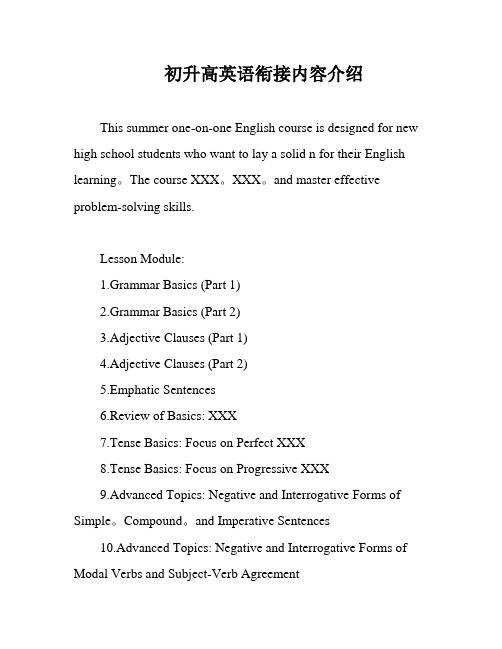
初升高英语衔接内容介绍This summer one-on-one English course is designed for new high school students who want to lay a solid n for their English learning。
The course XXX。
XXX。
and master effective problem-solving skills.Lesson Module:1.Grammar Basics (Part 1)2.Grammar Basics (Part 2)3.Adjective Clauses (Part 1)4.Adjective Clauses (Part 2)5.Emphatic Sentences6.Review of Basics: XXX7.Tense Basics: Focus on Perfect XXX8.Tense Basics: Focus on Progressive XXX9.Advanced Topics: Negative and Interrogative Forms of Simple。
Compound。
and Imperative Sentences10.Advanced Topics: Negative and Interrogative Forms of Modal Verbs and Subject-Verb AgreementCourse Objectives:Master word nFamiliarize with word class nXXXXXXMaster basic structure of simple sentencesDistinguish XXXMaster the use of relative pronouns and adverbs in adjective clausesMaster the use of XXXDistinguish een restrictive and non-restrictive adjective clausesXXXMaster basic and special uses of modal verbsXXX adjectives and adverbs and common XXXFocus on perfect tenses in tense basicsXXXXXXXXXXXX formatCourse le:The course consists of 15 lessons。
初升高英语衔接第一章基础知识衔接 专题一:语音
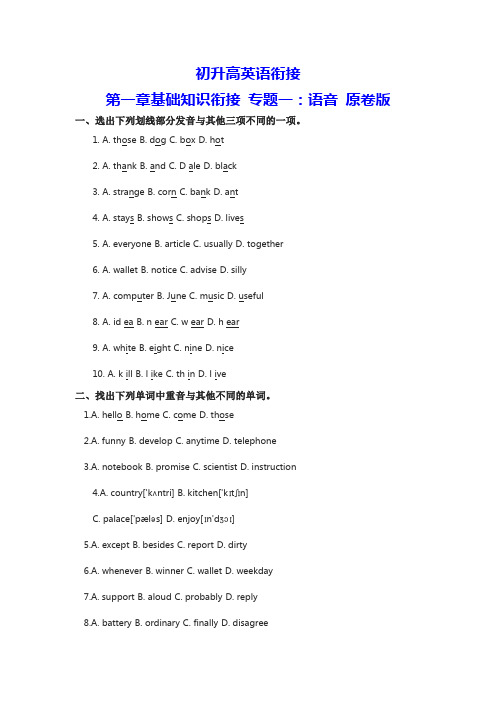
初升高英语衔接第一章基础知识衔接专题一:语音原卷版一、选出下列划线部分发音与其他三项不同的一项。
4.A. country['kʌntri]B. kitchen['kɪtʃɪn]C. palace['pæləs]D. enjoy[ɪn'dʒɔɪ]5.A. except B. besides C. report D. dirty6.A. whenever B. winner C. wallet D. weekday7.A. support B. aloud C. probably D. reply8.A. battery B. ordinary C. finally D. disagree9.A. daily B. article C. market D. together10.A. museum B. excuse C. arrive D. exercise三、根据所给句意和音标,从每题A、B、C、D四个选项中,选出一个最佳答案。
1.My partner used to be afraid of giving a ______ /spi:tʃ/.A. speakB. speechC. spreadD. spoke2.The English teacher takes the ________ / teɪp / player to the classroom every day.A. topB. tapeC. tripD. shop3.We had great ______/fʌn /walking in the beautiful park.A. phoneB. fanC. fineD. fun4.Both of my parents ________ /wɜ:k/ in a bank.A. walkB. weekC. workD. weak5.All of them __________ /wə:k/ really hard.A. walkB. workC. wordD. weak6.Outdoor exercise makes us strong in_________/maɪnd/ and body.A. matterB. meanC. mixD. mind7.Please call me ________ /su:n/ and tell me what's wrong with you.A. soonB. someC. singD. son8.I'm trying to __________ /tiːtʃ/ my friend John to play the guitar.A. teachB. toothC. touchD. truth9.This new ________ /'prɒdʌkt/ sells well in Jinan.A. protectB. projectC. productD. perfect10.My ________/'həʊmtaʊn/ is becoming more and more beautiful.A. houseworkB. holidayC. hardlyD. hometown11.Are you going to the pop ______ /'kɒnsət/ on Sunday?A. collegeB. concertC. collectD. collection12.Every night we hear strange ________['nɔɪzɪz] outside ourA. noseB. noisesC. noisyD. notice13.Our English teacher is really ______ /'peiʃnt/ with us.A. patientB. parentC. planetD. project14.There is a baseball _______ /tiːm/ in Bob's school.A. themB. teamC. timeD. term15.May I bring my _________ /tʃeə(r)/ next to yours?A. checkB. chairC. cheapD. chain16.They often go to the park on __________ /ˈsʌni/ days.A. funnyB. sorryC. rainyD. sunny17.I /rɪ'gɑːd /my pet dog as my best friend.A. recordB. regardC. rapidD. remind18.The football /kəʊt∫/is very kind to all the players and has a lot of experience.A. coachB. coastC. cuteD. kite19.The ______ /praɪs/ of the tomatoes is quite high.A. riceB. priceC. raceD. peace20. China is a country which loves__________/pi:s/ and turns against war.A.peaceB.pace.C. pleaseD.pies初升高英语衔接第一章基础知识衔接专题一:语音解析版一、选出下列划线部分发音与其他三项不同的一项。
初升高衔接教材的答案英语

初升高衔接教材的答案英语Unit 1: Greetings and IntroductionsPart 1: Vocabulary1. Hello - 你好2. Good morning - 早上好3. How are you? - 你好吗?4. I'm fine, thank you. - 我很好,谢谢。
5. What's your name? - 你叫什么名字?6. My name is... - 我叫...Part 2: Grammar1. Use "is" for singular nouns. For example: "My name is John."2. Use "are" for plural nouns. For example: "These books are interesting."3. Use "am" with "I". For example: "I am a student."Part 3: Reading ComprehensionText: "Hello, my name is Mary. I am a new student. How are you?"Answer: Mary is a new student and she is asking about the other person's well-being.Part 4: Listening ExerciseListen to the dialogue and answer the following questions: - What is the boy's name?- Where is he from?- What does he like to do?Unit 2: Daily RoutinesPart 1: Vocabulary1. Wake up - 醒来2. Brush teeth - 刷牙3. Have breakfast - 吃早餐4. Go to school - 上学5. Have lunch - 吃午餐6. Afternoon - 下午Part 2: Grammar1. Use the present simple tense to talk about routines. For example: "I wake up at 7 o'clock every morning."2. Use "usually", "often", "sometimes", "never" to describe frequency. For example: "I usually have breakfast before going to school."Part 3: Reading ComprehensionText: "Every day, I wake up at 6:30 am. I brush my teeth and have breakfast. Then I go to school by bus."Answer: The person wakes up at 6:30 am, brushes their teeth, has breakfast, and goes to school by bus.Part 4: Writing ExerciseWrite a short paragraph about your daily routine.Unit 3: School SubjectsPart 1: Vocabulary1. Mathematics - 数学2. Science - 科学3. History - 历史4. Geography - 地理5. English - 英语6. Art - 艺术Part 2: Grammar1. Use "like" and "dislike" to express preferences. For example: "I like English."2. Use "best" and "worst" to talk about the most and least favorite subjects. For example: "Mathematics is my best subject."Part 3: Reading ComprehensionText: "My favorite subject is science because it's interesting. I dislike history because it's boring." Answer: The person's favorite subject is science and theyfind history boring.Part 4: Speaking ExerciseDiscuss with a partner about your favorite and least favorite subjects and why.Unit 4: Hobbies and InterestsPart 1: Vocabulary1. Reading - 阅读2. Playing sports - 做运动3. Drawing - 画画4. Dancing - 跳舞5. Singing - 唱歌6. Traveling - 旅行Part 2: Grammar1. Use "enjoy" to talk about activities you like doing. For example: "I enjoy reading books."2. Use "would rather" to compare preferences. For example: "I would rather play sports than watch TV."Part 3: Reading ComprehensionText: "In my free time, I enjoy playing the guitar and listening to music. I also like to travel and explore new places."Answer: The person enjoys playing the guitar, listening to music, and traveling.Part 4: Group DiscussionDiscuss with your group what hobbies and interests you all share.End of Unit ExercisesThis concludes the English section of the initial high school transition material. It is important to practice regularly and engage in activities that will help you become more comfortable with the language. Remember, practice makes perfect!。
初升高英语学习资料
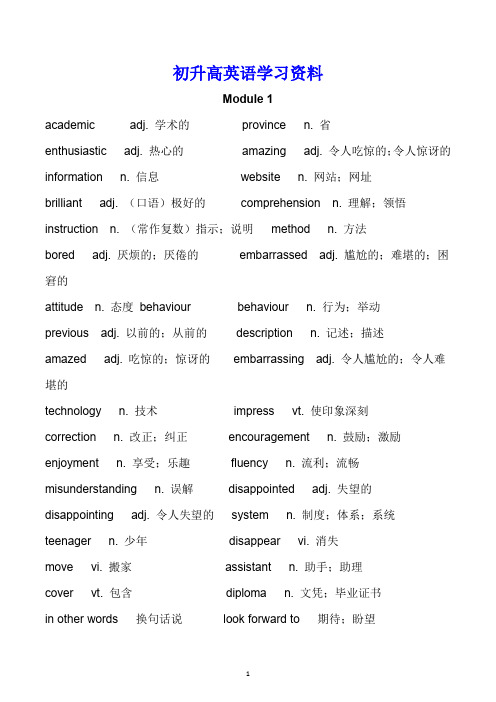
初升高英语学习资料Module 1academic adj. 学术的province n. 省enthusiastic adj. 热心的amazing adj. 令人吃惊的;令人惊讶的information n. 信息website n. 网站;网址brilliant adj. (口语)极好的comprehension n. 理解;领悟instruction n. (常作复数)指示;说明method n. 方法bored adj. 厌烦的;厌倦的embarrassed adj. 尴尬的;难堪的;困窘的attitude n. 态度behaviour behaviour n. 行为;举动previous adj. 以前的;从前的description n. 记述;描述amazed adj. 吃惊的;惊讶的embarrassing adj. 令人尴尬的;令人难堪的technology n. 技术impress vt. 使印象深刻correction n. 改正;纠正encouragement n. 鼓励;激励enjoyment n. 享受;乐趣fluency n. 流利;流畅misunderstanding n. 误解disappointed adj. 失望的disappointing adj. 令人失望的system n. 制度;体系;系统teenager n. 少年disappear vi. 消失move vi. 搬家assistant n. 助手;助理cover vt. 包含diploma n. 文凭;毕业证书in other words 换句话说look forward to 期待;盼望at the start of 在...开始的时候at the end of 在...结束的时候go to college 上大学be divided into 被(划)分成… take part in 参加Module 2amusing adj. 有趣的;可笑的energetic adj. 精力充沛的intelligent adj. 聪明的nervous adj. 紧张的;焦虑的organised adj. 有组织的;有系统的patient adj. 耐心的serious adj. 严肃的shy adj. 害羞的;羞怯的strict adj. 严格的;严厉的impression n. 印象avoid vt. (故意)避开hate vt. 讨厌;不喜欢incorrectly adv. 不正确地completely adv. 十分地;完全地immediately adv. 立即,即刻appreciate vt. 感激admit vt. 承认scientific adj. 科学的literature n. 文学loudly adv. 大声地wave vt. 挥(手);招(手)joke n. 玩笑;笑话summary n. 总结;摘要;提要respect vt. &n. 尊敬;尊重grade n. (美)成绩;分数headmaster n. 校长headmistressn. 女校长period n. 一段时间revision n. 复习translation n. 翻译timetable n. 时间表topic n. 话题;题目vacation n. 假期revise vt. 温习(功课)discipline n. 纪律relationship n. 关系formal adj. 正式的relaxed adj. 轻松的;松懈的;宽松的similarly adv. 同样地,类似地make sure 确定;确信;查明;弄清楚so that (引起表示结果的从句)因此make progress 取得进步as a result 结果in fact 事实上fall asleep 睡着tell jokes 讲笑话;开玩笑Module 3helicopter n. 直升飞机motorbike n. 摩托车tram n. 电车distance n. 距离abandoned adj. 被遗弃的camel n. 骆驼cassette n. 录音带desert n. 沙漠diamond n. 钻石expert n. 专家midnight n. 半夜product n. 产品scenery n. 风景;景色shoot vt. (shot,shot)射杀soil n. 土壤journey n. 旅程train vt. 训练circus n. 马戏团seaside n. 海滨stadium n. 运动场;体育场eagle n. 鹰frighten vt. 使吃惊;惊吓kindergarten n. 幼儿园apartment n. 公寓;单元住宅cartoon n. 卡通;漫画interview n. 面试;面谈interviewer n. 主考官;面谈者event n. 事件exhausted adj. 疲惫不堪的downtown adj. 商业区的vacuum n. 真空;空白rail n. 铁轨Ceremony n. 仪式track n. 轨道souvenir n. 纪念品get on 上(车、船等)get off 下(车、船等)get into 上(车)get out of 下(车)take off (飞机)起飞out of date 过时refer to 指的是Module 4survey n. 调查neighbourhood n. 四邻;街坊local adj. 地方的;局部的suburb n. 城郊;郊区hometown n. 家乡attractiveadj. 有吸引力的fortunate adj. 幸运的;吉祥的pretty adv. 很;相当sound vi. 听起来tourist n. 旅游者;观光客bother vt. 打扰;烦扰;麻烦nuisancen. 令人讨厌的人或事rent n. 租金district n. 地域;区域approach vt. 接近harbour n. 海港gorgeous adj. 美丽的;宜人的architecture n. 建筑starve vi. 饿死park vt. 停车traffic n. 交通committee n. 委员会organisation n. 组织unemployed adj. 失业的;没有工作的household n. 家属;家人occupation n. 职业professional adj. 专业的manual adj. 用手的;手的employment n. 就业;工作;职业gallery n. 美术馆;画廊exchange vt. 交换fascinating adj. 迷人的afford vt. 买得起survive vi. 死里逃生contact vt. 联络put up 修建so far 到目前为止up to now 到目前为止till now 到目前为止get away from 摆脱a great many许多;大量 a number of 许多;大量go up上升Module 5liquid n. 液体expand vi. 膨胀contract vi. 收缩substance n. 物质mixture n. 混合物oxygen n. 氧气electricity n. 电stage n. 阶段;时期conclusion n. 结论aim n. 目标reaction n. 反应electrical adj. 与电有关的equipment n. 设备;装备react vi. (化学)反应potassium n. 钾sodium n. 钠calcium n. 钙magnesium n. 镁aluminium n. 铝zinc n. 锌partial adj. 部分的;局部的copper n. 铜oxide n. 氧化物rust vi. 生锈boil vt. 煮;煮沸ordinary adj. 普通的;平常的steam n. 蒸汽;水气float vi. 漂浮form vi. 形成dissolve vi. 溶解;分解;分离balance n. 天平crucible n. 坩埚tongs n. (复)夹子;小钳子facility n. (常作复数)设备;工具lecture n. 演讲department n. (大学的)科、系astonished adj. 吃惊的;惊愕的add...to... 往...加入..used to 过去(常常)in the area of 在...领域be proud of 为...感到骄傲/自豪be supposed to 应当;理应Module 6contain vt. 包含;包括access n. 接近;通路crash vi. (计算机)崩溃keyword n. 密码;口令log vt. 记录;登录software n. 软件breakdown n. 故障source n. 来源;出处accessible adj. 可进入的;可使用的data n. (复)数据defence n. 保护;防卫create vt. 创造;发明network n. 网络via prep. 途经;经由percentage n. 百分数;百分率design vt. 设计document document n. 文件invention n. 发明permission n. 许可military adj. 军事的;军队的concentrate vi. 集中(注意力、思想等)definite adj. 明确的fantastic adj. 极好的;美妙的independent adj. 独立的essay n. 文章pass vt. 超过frequently adv. 时常;经常disadvantage n. 弊端;缺点average adj. 平均的statistics n. 统计数字shorten vt. 缩短sideways adv. 横着地;斜着地consist of 由...组成as well 也become known as... 作为...而出名;被称为...;叫作…go down 下降come up with 提出from that moment on 从那时起concentrate on 聚精会神;集中思想compared with 与...相比TextsModule 1 My First Day at Senior HighMy name is Li Kang. I live in Shijiazhuang, a city not far from Beijing. It is the capital city of Hebei Province. Today is my first day at Senior High school and I’m writing down my thoughts about it.My new school is very good and I can see why. The teachers are very enthusiastic and friendly and the classrooms are amazing. Every room has a computer with a special screen, almost as big as a cinema screen. The teachers write on the computer, and their words appear on the screen behind them.The screens also show photographs, text and information from websites. They’re brilliant!The English class is really interesting. The teacher is a very enthusiastic woman calledMs Shen. We’re using a new textbook and Ms Shen’s method of teaching is nothing like the teachers at my Junior High school. She thinks that reading comprehension is importan t, but we speak a lot in class, too. And we have fun. I don’t think I will be bored in Ms Shen’s class!Today we introduced ourselves to each other. We did this in groups. Some students were embarrassed at first but everyone was very friendly and it was really nice. Ms Shen gave us instructions and then we worked by ourselves.Ms Shen wants to help us improve our spelling and handwriting. We do this in a fun way, with spelling games and other activities. I like her attitude very much, and the behaviour of the other students shows that they like her, too.There are sixty-five students in my class — more than my previous class in Junior High. Forty-nine of them are girls. In other words, there are three times as many girls as boys. They say that girls are usually more hard-working than boys, but in this class, everyone is hard-working. For our homework tonight, we have to write a description of the street where we live. I’m looking forward to doing it!Moudle 2 My New TeachersThey say that first impressions are very important. My first impression of Mrs. Li was that she was nervous and shy.I think perhaps she was, as it was her first lesson with us. But now, after two weeks, the class really likes working with her. She's kind and patient, and she explains English grammar so clearly that even Ican understand it!She avoids making you feel stupid! I've always hated making mistakes or pronouncing a word incorrectly when I speak English,but Mrs. Li just smiles, so that you don't feel completely stupid! I think maybe she goes a bit too slowly for the faster students, but for me it's wonderful! I feel I'm going to make progress with her.I'd guess that Mrs. Chen is almost sixty. She's very strict—we don't dare to say a word unless she asks us to. She's also very serious and doesn't smile much. When she asks you to do something, you do it immediately! There are a few students in our class who keep coming to class late but they're always on time for Mrs. Chen's lessons!Some of our class don't ike her, but most of us really appreciate her because her teaching is so well organised and clear. And a few students even admit liking her!During scientific experiments, she explains exactly what is happening and as a result my work is improving.Physics will never be my favourite lesson, but I think that I’ll do well in the exam with Mrs Chen teaching me. Mr. Wu’s only been teaching us for two weeks and he’s already very popular. I think this is because he really enjoys teaching Chinese literature ---- he loves it, in f act! He’s got so much energy, this is one class you do not fall asleep in! He’s about 28, I think, and is rather good-looking. He talks loudly and fast, and waves his hands about a lot when he gets excited. He’s really amusing and tells jokes when he thinks we’re getting bored. Even things like compositions and summaries are fun with Mr. Wu. I respect him a lot.Module 3 My First Ride on a TrainMy name is Alice Thompson. I come from Sydney, Australia and I’m 18 years old.Recently I had my first ride on a long-distance train. And what a ride! A friend and I traveled on the famous Ghan train. We got on in Sydney and we got off in Alice Springs, right in the middle of Australia, more than four thousand kilometers away.We spent two days and nights on the train.The train was wonderful and the food was great. We ate great meals cooked by experts! For the first few hundred kilometres of the journey, the scenery was very colourful. There were fields and the soil was dark red. After that, it was desert.The sun shone, there was no wind and there were no clouds in the sky. Suddenly, it looked like a place from another time.We saw abandoned farms which were built more than a hundred years ago.The train was comfortable and the people were nice.During the day, I sat and looked out of the window, and sometimes talked to other passengers.I read books and listened to my Chinese cassettes (I'm studying Chinese at school). One night,at about midnight, I watched the night sky for about an hour. The stars shone like diamonds.Why is the train called the Ghan? A long time ago, Australians needed a way to travel to the middle of the country.They tried riding horses, but the horses didn't like the hot weather and sand. A hundred and fifty years ago, theybrought some camels from Afghanistan. Ghan is short for Afghanistan. Camels were much better than horses for travelling a long distance.For many years, trained camels carried food and other supplies, and returned with wool and other products.The Afghans and their camels did this until the 1920s.Then the government built a new railway line, so they didn't need the camels any more. In 1925,they passed a law which allowed people to shoot the animals if they were a problem. In 1935, the police in a town shot 153 camels in one day.Moudle 4 a social survey –my neighbourhoodA lively cityXL:It's great to see you again, John.JM:It's great to see you! It's been six years since we last saw each other, you know. And this is the first time I've visitedyour hometown.XL:Yes, I'm so glad you could come.JM:You know, I've seen quite a lot of China and I've visited some beautiful cities, but this is one of the most attractive places I've been to. It's so lively, and everyone seems so friendly.XL:Yes, it's one of the most interesting cities on the coast,everyone says so. I feel very fortunate living here. And I love living by the seaside.JM; You live in the northwest of Xiamen, is that right?XL:Yes, that's right.JM:What's the climate like?XL:Pretty hot and wet in the summer, but it can be quite cold in the winter.JM:Sounds OK to me. There are a lot of tourists around. Don't they bother you? XL:Yes, they can be a nuisance in the summer because there are so many of them. JM:Oh, look at that huge apartment block!XL:Yes, they've just completed it. The rent for an apartment there is very high.JM:I believe you! This area's so modern!XL:Yes, this is the business district. They've put up a lot of high-rise buildings recently. And there are some great shopping malls.See, we're just passing one now. My wife's just bought a beautiful dress from one of the shops there.JM:Maybe I could buy a few presents there.XL:I'll take you there tomorrow. Now we're leaving the business district and approaching the harbour.We're entering the western district, the most interesting part of the city. It's got some really pretty parks ...JM:It seems lovely. Is that Gulangyu Island, just across the water?XL:Yes, it is. It's a gorgeous island with some really interesting architecture.JM:So they tell me. Do you think we could stop and walk around for a while?XL: Yes, I was just going to do that. We can park over there.A friend's told me about a nice little fish restaurant near here. Shall we go there for lunch?JM:That sounds great. I'm starving!Moudle 5 a lesson in a LabPassage AIt is hard to think of a world without metals. Different metals have different uses, for example, steel is used in cars, and iron is used in electrical equipment. When we use metals, it is important to know how they react with different substances, for example, water and oxygen. The reaction of metals with these substances can be put in order. Here is a table with the metals that react most at the top, and the metals that react least at the bottom.an oxide = another substance + oxygenPassage B●A Simple Scientific Experiment●Below is a description of a simple scientific experiment. It shows us how ironreacts with air and with water.* an oxide = another substance + oxygenAim: To find out if iron rusts (a) in dry air; (b) in water that has no air in it (air-free Apparatus: 3 clean iron nails; test tubes; test tube holder; cotton wool; oil; Bunsen burne Aim: To find out if iron rusts (a) in dry air; (b) in water that has no air in it(air-free water); (c) in ordinary water.Apparatus: 3 clean iron nails; test tubes; test tube holder; cotton wool; oil;Bunsen burner.Iron in dry airMethod1. Put some iron nails at the bottom of a test tube.2. Push some cotton wool down the tube.3. Leave the tube for one week.ResultAfter one week, the nails have not rusted.ConclusionIron does not rust in dry air.Iron in air-free waterMethod1. Half-fill a test tube with water.2. boil the water for three minutes. (This makes sure there is no air in the water.)3. Put two or three clean nails in the water.4. Add some oil to the water. This will keep air out of the water.5. Leave the tube for one week.ResultThe nails do not rust in the tube with air-free water.ConclusionIron does not rust in air-free water.Iron in ordinary water1. Half-fill a test tube with water and add two or three clean nails.2. Leave the tube for one week.ResultThe nails rust in the tube with ordinary water.ConclusionIron rusts in ordinary water.Iron in dry airMethod1。
- 1、下载文档前请自行甄别文档内容的完整性,平台不提供额外的编辑、内容补充、找答案等附加服务。
- 2、"仅部分预览"的文档,不可在线预览部分如存在完整性等问题,可反馈申请退款(可完整预览的文档不适用该条件!)。
- 3、如文档侵犯您的权益,请联系客服反馈,我们会尽快为您处理(人工客服工作时间:9:00-18:30)。
2016年暑假妙笔初升高英语辅导资料(一)How to Miss a TrainIris is very forgetful and so she worries a great deal; She worries a great deal and so she becomes even more forgetful. She also talks to herself a lot. Here is an example of what can happen when she is going out.She has her hat and coat on and is just about to open the front door. She stops a moment.‘Is the electric cooker off?’Iris never forgets to turn the cooker off but she goes back to the kitchen to make sure. Yes, the cooker is off.‘ Good. That’s all right. Now. I must hurry.’She goes back to the front door and opens it. Then she closes it again.‘Is the television off in the sitting-room? Yes, of course it must be. I can’t hear it. But perhaps there’s no programme on just now. I must go and see if it’s off.’She goes to the sitting-room and feels a knob on the television set.‘Yes, I don’t usually forget that. Oh dear! It’s getting a bit late. I don’t want to miss that train.’So she goes back to the front door and opens it. She is going through the doorway when she stops suddenly.‘My key! If I forget that, I can’t get in tonight. It’s somewhere in my handbag, I think. No. it’s not in my purse; not in the front pocket; not loose with my powder compact and handkerchief. Ah, I know! Yes. It’s in my coat pocket. Thank goodness!‘ Oh, but the cellar light, Is that off? I must go and see’She closes the front door again and goes to the cellar door. She opens it and looks downstairs. The cellar is in darkness.‘Can I possibly catch that train now? I still have to buy a ticket. Oh dear! I must run all the way.’But her trouble aren’t over. They are really only just staring. Halfway down the garden path she looks at the sky, which is covered with grey clouds. She looks back at the house.’‘I know it’s going to rain. And that bedroom window is wide open. I must close it. I suppose I can catch the next train.’She opens the door again, putting the sky back in her handbag. She throws her handbag on the hall table, rushes upstairs and closes the window.‘ I must fly. I may catch it with a bit of luck.’She runs downstairs and straight out of the house, closing the door behind her noisily.But she doesn’t catch either the first or the second train.And it doesn’t rain all day.Poor Iris!Exercises一.Fill in the blanks with can may must and need and then translate the sentences into Chinese;1.You ____ not go by bus now if you are not ready. You ______go by bike, but you _____get there before three o’clock. You ____ not be late.2.I _____ not open this handbag. Something ______be wrong with it.3.Please turn on the radio. There _____be a good programmer on.4.It’s 7:45 already. We ____ run.5._______ we hand in over homework tomorrow afternoon? No, you ___ hand it intomorrow morning.6._____ I use a pen? No, you ____n’t. You ____ use a pencil.7.Xiao Ming _____ not be in the library because it is not open yet.8.If he ____ lift this heavy box, he_____be very strong.9.I _____ come tonight, but I _____ not be sure.10.It’s eight o’clock and he is still in bed. He _______be ill.11.It _____ rain, but you _____ n’t worry. I ____lend you my raincoat.12.You ____ use my bag, but you ____n’t lose it.二.Use word and expressions from the text instead of those italicized, making the necessary changes in the sentences:1.You are a little early today.2.The film ended at 9:30.3.I believe they have got tickets.4.The meeting will begin in ten minutes. You must be quick.5.Has the radio been turned off?6.Your boy has grown very much in the past year.7.After she uses the dictionary, she puts it on the desk again.8.She is wearing her new shoes today.9.I must be at the station at two o’clock.10.The train was just going to start when he arrived.11.He always remember to turn off the light before he leaves the room.12.they live in a certain place near the school.13.When she heard the good news, she ran upstairs to tell her mother.14.There is no light in the room三.Fill in the blanks with prepositions and adverbs:1.The nurse went _____ the sick man’s room and closed the door______ her quietly.2.How did you get ____ if there was nobody ______ home?rade Dong is ____ the sitting-room _____ a visitor.4.As he walked ____ the path. He did not even look back ____his family.5.Did he have his coat ____ when he went _____?6.The old woman often talks _____ herself when she is alone _____ the house.7.They went _____ the doorway and then upstairs _____ their teacher’s room.8.If your handkerchief is not ______ your handbag, it must be _____ your pocket.9.All the lights were ______ and the whole house was ____ darkness.10.He thought his troubles were ____, but suddenly he heard a loud noise ____ the cellar.11.He thought his first knob ___ the television set to see if there was a good programme___12.She took the money ___ ____ her purse and threw it ___ the table.13.Please give us an example ____ how he learned ___ others.14.____ a bit ____ luck you may get back ____ your school before it starts raining . 四.Translate the following into Chinese:1.Sit down. You must be tired.2.You must put on your coat. It’s very cold outside.3.Here’s his key. He must be a very forgetful person.4.You must go and talk to him.5.You must start before then o’clock.6.Look at him. He must be angry with us.7.Let’s ask her. She must know where he is.8.We mustn’t get there late.9.You must be very careful when you open the box.10.It must be somewhere in your room.五.Translate the following into English, using the words and expressions given below: be about +inf. see if miss be + v-ing ….when somewhere be covered with either … or …1.她要走出房子的时候,回头看看灯是否都关了。
